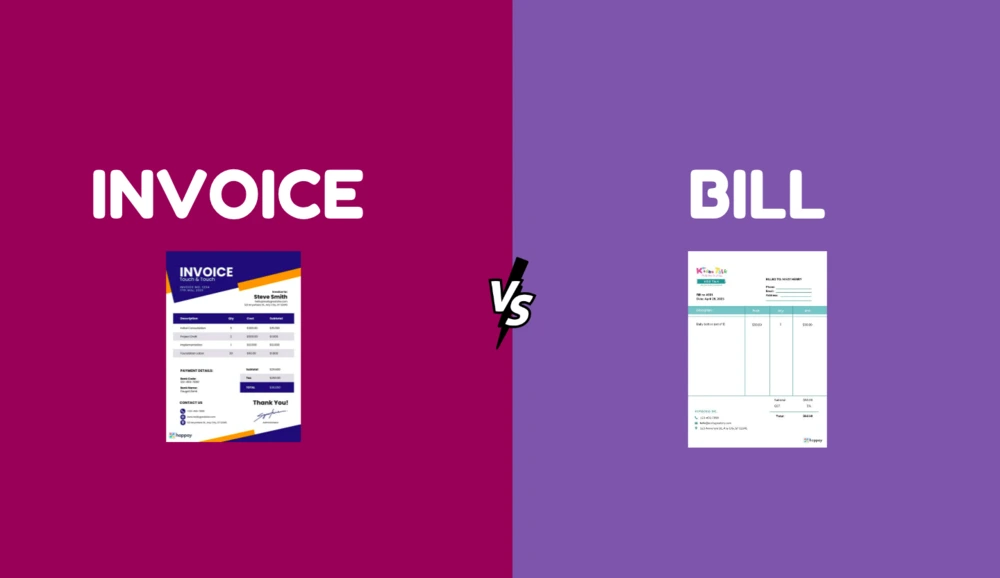Invoices and tax invoices are integral to all financial transactions in a business. They provide a document that can be used as evidence of a transaction and to calculate taxes due. In India, all sellers registered with the GST must issue a tax invoice when selling goods or services. All other sellers must issue a regular invoice or bill.Invoices are an instrument that drives a business on a successful path. Invoices act as proof of the transaction that happened between customers and owners. There are two main types of invoices: Retail and tax invoices.

What is a GST tax invoice?
An invoice bill is a statement given by a vendor to a buyer detailing the goods sold or services provided and the amounts due for payment. It is a contract between the seller and the buyer. Invoices play a vital role in all financial transactions, from the simple sale of goods to the complex supply chain of a company.Tax invoice is an invoice issued for the sale of taxable goods or services. Tax invoice includes details such as the description, quantity, price, applicable taxes, and and any other information required by local tax authorities.
A tax invoice is a crucial formal document issued by a seller to a buyer that describes a transaction between them. This document is essential for keeping clear financial records and complying with tax requirements.
Example of a GST tax invoice
A company, RZ Electronics, selling a laptop to a customer XYM for ₹10,000. The tax invoice would itemize the buyer and seller details, invoice number, date, product details, quantity, and value. Additionally, it would specify the tax rates and amounts, such as an 18% GST.
In this scenario, the tax invoice would calculate a total tax amount of ₹1,800, leading to a total payable amount of ₹11,800. It is issued by RZ Electronics to XYM, ensuring a transparent record of the transaction. This clarity helps the organization comply with tax laws and mitigates the risk of disputes or legal complications in the future.
What is an invoice bill?
An invoice bill is a statement given by a vendor to a buyer detailing the goods sold or services provided and the amounts due for payment. It is a contract between the seller and the buyer. Invoices play a vital role in all financial transactions, from the simple sale of goods to the complex supply chain of a company.
What are some differences between an invoice bill and a GST tax invoice?
- An invoice bill is a document sent to a customer from a seller with details of goods or services purchased and the total amount due. A GST tax invoice is a document issued by a seller to a customer when goods or services are sold at a taxable price.
- An invoice bill does not include the tax amount payable, while a GST tax invoice does. This is important to remember when filing taxes, as the tax amount payable must be included in the calculation.
- The purchaser or end customer often receives an invoice bill. A GST tax invoice is issued to another firm or company for supplies that will be resold or used for manufacturing.
- The primary goal of an invoice bill is to demand payment for delivered products or rendered services. The primary goal of a GST tax invoice is to obtain a tax credit or other form of tax relief.
- The purpose of an invoice bill is to keep track of sales and purchases for accounting. A GST tax invoice helps keep track of taxable sales and purchases to calculate taxes.
- In addition to the tax amount payable, there are a few other differences between an invoice bill and a GST tax invoice. For example, an invoice may not include the buyer’s GSTIN (Goods and Services Tax Identification Number). In contrast, a GST tax invoice must include the buyer’s GSTIN. Furthermore, a GST tax invoice must include the seller’s GSTIN, which an invoice bill does not.
FAQs
How is a tax invoice different from a receipt?
The seller issues the customer a tax invoice, which specifies the transaction, including the price, quantity, and relevant taxes. In contrast, a receipt serves as verification of the buyer’s payment. While an invoice seeks payment, a receipt confirms that payment was made.
How do tax invoices relate to VAT/GST?
Tax invoices are critical for VAT/GST systems because they reflect the taxes levied on sales and enable organizations to claim input tax credits. They guarantee that taxes are collected and reported appropriately, which helps VAT/GST systems run smoothly.